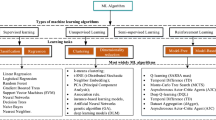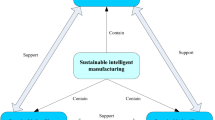Abstract
Automation and flexibility are often mentioned as key concepts in modern production industry. To increase the level of flexibility, deterministic finite automata (DFA) can be used to model, specify and verify the production systems. Often, it is also desirable to optimize some production criteria, such as for example the cycle time of a manufacturing cell. In this paper, a method for automatic conversion from DFA to a mixed integer linear programming (MILP) formulation is first presented. This conversion is developed for a number of DFA structures that have shown to be useful in practical applications. Special attention is paid to reducing the search region explored by the MILP solver. Second, a conversion from the MILP solution to a DFA supervisor is described. This allows to combine the advantages of DFA modeling with the efficiency of MILP and supervisory control theory to automatically generate time-optimal, collision-free and non-blocking working schedules for flexible manufacturing systems.










Similar content being viewed by others
References
Adams J, Balas E, Zawack D (1988) The shifting bottleneck procedure for job shop scheduling. Manage Sci 34(3):391–401
Åkesson K, Fabian M, Flordal H, Malik R (2006) Supremica—an integrated environment for verification, synthesis and simulation of discrete event systems. In: Proc. of the 8th workshop on discrete event systems (WODES’06), Ann Arbor
Bayen AM, Tomlin CJ, Yinyu Y, Zhang J (2003) Milp formulation and polynomial time algorithm for an aircraft scheduling problem. In: 42nd IEEE international conference on decision and control, Maui
Blazewicz J, Domschke W, Pesch E (1996) The job shop scheduling problem: conventional and new solution techniques. Eur J Oper Res 93:1–33
COIN-OR Branch and Cut (2008) Cbc homepage. http://projects.coin-or.org/Cbc
de Berg M, van Kreveld M, Overmars M, Schwarzkopf O (2000) Computational geometry, 2nd edn. Springer, Berlin Heidelberg New York
Falkman P, Nielsen J, Lennartson B, von Euler-Chelpin A (2008) Generation of step ap214 models from discrete event systems for process planning and control. IEEE Trans Autom Sci Eng 5:113–126
Fisher H, Thompson G (1963) Industrial scheduling. In: Muth JF, Thompson GL (eds) Chapter probabilistic learning combinations of local job-shop scheduling rules. Prentice Hall, Englewood Cliffs
Flordal H, Malik R, Fabian M, Åkesson K (2007) Compositional synthesis of maximally permissive supervisors using supervision equivalence. Discret Event Dyn Syst 17(4):475–504
GNU Linear Programming Kit (2008) GNU Linear Programming Kit homepage. http://www.gnu.org/software/glpk
Hoare CAR (1985) Communicating sequential processes. Prentice Hall International Series in Computer Science. Prentice Hall, Englewood Cliffs
Huang Z, Wu Z (2004) Deadlock-free scheduling for automated manufacturing systems using genetic algorithm and petri nets. In: IEEE international conference on robotics and automation, New Orleans
ILOG CPLEX (2008) ILOG homepage. http://www.ilog.com
ISO 10303-1 (1994) Industrial automation systems and integration—product data representation and exchange—part 1: overview and fundamental principles. ISO standard
Johnson DB (1975) Finding all the elementary circuits of a directed graph. SIAM J Comput 4:77–84
Kobetski A, Fabian M (2006) Scheduling of discrete event systems using mixed integer linear programming. In: Proc. of the 8th IEEE international workshop on discrete event systems. Ann Arbor
Kobetski A, Flordal H, Lennartson B, Fabian M (2009) A framework for automatic generation of interlocking functions for flexible manufacturing. Technical Report, Department of Signals and Systems, Chalmers University of Technology, ISSN 1403-266x; nr R004/2009
Kobetski A, Richardsson J, Åkesson K, Fabian M (2007) Minimization of expected cycle time in manufacturing cells with uncontrollable behavior. In: Proc. of the IEEE conference on automation science and engineering, Scottsdale
Kobetski A, Spensieri D, Fabian M (2006) Scheduling algorithms for optimal robot cell coordination—a comparison. In: Proc. of the IEEE conference on automation science and engineering, Shanghai
Lawley MA (1999) Deadlock avoidance for production systems with flexible routing. Trans Robot Autom 15:497–509
Lee DY, DiCesare F (1994) Scheduling flexible manufacturing systems using petri nets and heuristic search. IEEE Trans Robot Autom 10:123–132
Li Y, Wonham WM (1994) Control of vector discrete-event systems II—controller synthesis. Trans Automat Contr 39(3):512–531
Liljenvall T (1998) Scheduling for production systems. Lic. Thesis 293L, School of Electrical and Computer Engineering, Chalmers University of Technology
Linderoth JT, Ralphs TK (2005) Noncommercial software for mixed-integer linear programming. In: Karlof J (ed) Integer programming: theory and practice. CRC Press Operations Research Series. CRC, Boca Raton, pp 253–303
Liu J, MacCarthy BL (1997) A global milp model for fms scheduling. Eur J Oper Res 100:441–453
Mendez CA, Cerda J (2004) An milp framework for batch reactive scheduling with limited discrete resources. Comput Chem Eng 28:1059–1068
Niño-Mora J (2001) Stochastic scheduling. In: Floudas CA, Pardalos PM (eds) Kluwer, Dordrecht, pp 367–372
Nowicki E, Smutnicki C (1996) A fast taboo search algorithm for the job shop problem. Manage Sci 42(6):797–813
Peng J, Akella S (2005) Coordinating multiple double integrator robots on a roadmap: convexity and global optimality. In: IEEE international conference on robotics and automation. IEEE, Barcelona, pp 2751–2758
Ramadge P, Wonham W (1989) The control of discrete event systems. Proc IEEE 77:81–98
Reeves CR, Rowe JE (2002) Genetic algorithms—principles and perspectives: a guide to GA theory. Operations Research/Computer Science Interfaces Series. Springer, Berlin Heidelberg New York
Reveliotis S, Lawley M, Ferreira P (1997) Polynomial complexity deadlock avoidance policies for sequential resource allocation systems. IEEE Trans Automat Contr 42:1344–1357
Russell S, Norvig P (1995) Artificial intelligence—a modern approach. Prentice Hall International Editions. Prentice Hall, Englewood Cliffs
Schouwenaars T, DeMoor B, Feron E, How J (2001) Mixed integer programming for safe multi-vehicle cooperative path planning. In: The 2001 European control conference, Porto
Schrijver A (1986) Theory of linear and integer programming. Wiley, Chichester
Segala R (1995) Modeling and verification of randomized distributed real-time systems. PhD thesis, Massachusetts Institute of Technology
Silberschatz A, Peterson G (1991) Operating systems concepts. Addison-Wesley, Reading
Tarjan R (1972) Depth-first search and linear graph algorithms. SIAM J Comput 1:146–160
Williams HP (1990) Model building in mathematical programming. Wiley, New York
Author information
Authors and Affiliations
Corresponding author
Rights and permissions
About this article
Cite this article
Kobetski, A., Fabian, M. Time-Optimal Coordination of Flexible Manufacturing Systems Using Deterministic Finite Automata and Mixed Integer Linear Programming. Discrete Event Dyn Syst 19, 287–315 (2009). https://doi.org/10.1007/s10626-009-0064-9
Received:
Accepted:
Published:
Issue Date:
DOI: https://doi.org/10.1007/s10626-009-0064-9




